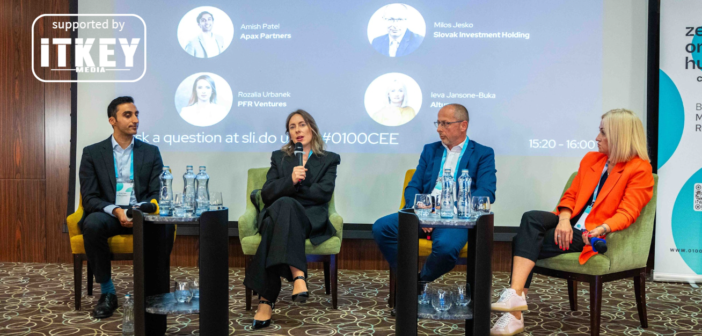- Zero One Hundred Conferences’ 0100 Conference 2024 CEE presented two days heavily staffed with insights
- Arguably the topical theme is the role of government agencies in investment
- The expert speakers agreed that while the CEE region is quite attractive for international investors, there are still many obstacles, particularly legal, and markets should rely more on local sources of capital
On May 14-16th, Hotel NH Collection Prague Carlo IV’s opened to host the 2024 edition of Zero One Hundred Conferences’ 0100 Conference CEE.The regular event with over 100 thought-leading speakers was primarily (but not exclusively) aimed at LPs and PEs. As such, the Conference’s agenda was adjusted accordingly.
ITKeyMedia spotlights the closing panel discussion dedicated to Government Agencies as the Cornerstone of the Market. The participants were:
- Ieva Jansone-Buka, Board Member at Altum
- Miloš Ješko, Board Member and CFO at Slovak Investment Holding
- Amish Patel, Former Tech/Buyout Investor at Apax Partners
- Rozalia Urbanek, Investment Director at PFR Ventures
Mr Patel was the discussion’s moderator. After brief introductions, he asked the speakers to share their view of the current state of government allocations in VC and their evolution.
State Money VS EU Money

Amish Patel, Former Tech/Buyout Investor at Apax Partners
As we know, in CEE the government funds are managing the money coming from the state and the European Commission. Ms Urbanek underscored the difference between these sources of capital. PFR Ventures invested the first batch of EU money between 2018 and 2022, and the VC funds who got this money are now finishing their investment lifecycles. Right now, they are in the process of receiving the next EUR ~0.5B of EU money, and they have already started investing it, which means that VCs can count on PFR Ventures’ proactiveness over the next couple of years. As for the state money, PFR Ventures will have to review its activity and strategy both in Poland and on the international scale.
Mr Ješko had to state that the Slovakian capital market is problematic: the country is small, the market is not ‘deep’ enough, and there is no investors’ culture. This means that there’s a lot to be done, also with the target companies and SMEs in general. The investors market is dominated by angel investors, families and friends, etc., and institutional investors are not taking the lead. At later stages, companies can attract international funds, but the early stage remains underserved. That’s why, according to Mr Ješko, Slovak Investment Holding places a heavy focus on the early stage segment. Thus, early rounds get funded with state money, but the Holdings prefers to co-invest with commercial investors in the later stages. Essentially, the government agency is there to boost the capacity of the market.
Even though the Baltics is a region and not a country, the three Baltic countries join forces on many occasions in terms of investment. Same as in some other places, they use both state money and EIF money. Ms Jansone-Buka estimated that out of roughly 100 investors in the Baltics, about 50 are using government money. Interestingly, Baltic state funds don’t rely on EU money as heavily as they used to, as Baltic state funds prefer to rely on each other and work jointly.
Barriers

Rozalia Urbanek, Investment Director at PFR Ventures
Naturally, the market activity could be facilitated by non-government investors, but there are barriers for them to enter these markets. The requirements to all institutional investors coming to Poland, for example, are essentially the same, regardless of where the capital is coming from. Ms Urbanek revealed that many of them struggle to reach the required quota of private capital to enter the market, which is required by both EIF and other institutional investors. According to her, even though Poland is still developing in this regard, the market is indeed developing as more family offices begin to appear.
Another obstacle in Poland is the lack of legal framework for including pension funds or insurance companies as LPs. Ms Urbanek underlined that it’s best to try and attract capital locally.
As for Latvia and the Baltics, the biggest barrier here is the small size of the region – only about 7 million people in three countries. Other than that, Ms Jansone-Buka doesn’t see a lot of barriers and insists that the Baltics are welcoming international capital. To quote numbers, only 22% of fundraising in the Baltics came from government agencies in 2023. By 2030, the Baltics have quite a few ambitious infrastructure projects to complete, which is also attractive for investments.
Slovakia started later than others in terms of developing investment culture, and the investment portfolios are young. That’s why – even though there are some success stories – local general partners don’t have a lot to present to attract international LPs. The only way Mr Ješko sees is gradual work on improving the overall investor culture, the legal framework, educating the SMEs, etc. Naturally, this work should be shared between government entities and other players, including EU agencies. The latter need to have more of their attention routed toward the equity market.
Ms Urbanek reminded about the geopolitical situation as another big barrier. There is an understanding that the defense system needs to be improved, and that’s where a lot of government investments will go. Importantly, this sector isn’t expected to have a lot of attention from international agencies – therefore, it will have to rely on regional funds. This, in turn, should increase the role of local funds.
What’s Next

Ieva Jansone-Buka, Board Member at Altum
PFR Ventures’ focus is to support innovation. For this purpose, it is necessary to increase the institutional investor base in Poland. In Slovakia, Mr Ješko’s agency will select three commercial directors who will invest the next batch of EU funds into Seed-stage companies who need government assistance the most.
Ms Jansone-Buka sees the private equity market in the Baltics as mature enough and no longer in need of government assistance, so government agencies intend to step out of private equity, although not completely. Altum plans to focus on certain sectors, such as green tech and defense. The agency will also direct its attention toward VC in cooperation with colleagues from other Baltic countries and invest across Europe.
As representatives of developing countries in terms of PE and VC, CEE countries will continue following the steps of more mature EU countries. To do this, government support is required, as well as the involvement of other institutions, Ms Urbanek reiterated.
Mr Ješko agrees that government allocations are expected to increase, regardless of the past and upcoming elections. Everybody involved recognizes that the market needs to be nurtured and the gap needs to be bridged. In addition to the fresh EUR 100M of EU money, Mr Ješko expects exits that will allow to recycle some of the previously invested capital, which has less limitations than EU money. In other words, he has no doubt about the availability of money for future investments.
PFR Ventures is also looking to rely less on EU money to feel less restricted about the agency’s activities and strategies. Also, PFR Ventures is particularly interested in more mature VC funds who can attract up to 40% of private capital.
Opportunities and Attractiveness of CEE
Mr Ješko clearly sees a lot of opportunities for investment, i.e. attractive target companies in the CEE region. There is also a history of successful exits. What matters is the amount and size of these opportunities, and the Slovakian market requires the assistance of the likes of EIF to grow these numbers. Among other things, EIF involvement is a stamp of quality for a fund, i.e. potential LPs will have more confidence in an ‘EIF-approved’ fund manager.
Baltic agencies are confident about the region’s attractiveness, among other reasons, due to geographic and cultural proximity with the Nordics. There are active LPs from the Nordic countries, as well as calls for new VC funds. Vertical-wise, Ms Jansone-Buka pointed out energy efficiency and defense.
Ms Urbanek cited interest from other external players than EIF. To make the region even more attractive, the region needs to roll out consistent returns and increase the size of funds and deals – because bigger investors are interested in bigger tickets. As for VC funds themselves, Ms Urbanek believes that they need to be more specialized, – because international LPs clearly prefer those.
Legal Reforms in Practice
In Poland, Ms Urbanek pointed out the lack of a legal framework for smaller funds. She also reiterated the need to make it possible for entities like pension funds or insurance companies to get involved.
Mr Ješko agreed that Slovakia also has an expressed need to engage pension funds in investments, but what’s also important is to change the overall mentality that draws people away from venture investment. He suggested tax incentives as a means to this change. Ms Jansone-Buka added that the local fund managers also need to feel comfortable registering locally, which requires removing fee barriers.

Kostiantyn is a freelance writer from Crimea but based in Lviv. He loves writing about IT and high tech because those topics are always upbeat and he’s an inherent optimist!





